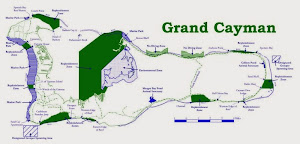Computer programmers are designing a smartphone app to allow boaters to assist with enforcement across an expanded network of marine parks.
The proposals, which include dramatically expanding the no-fishing zones around the Cayman Islands, will go through another round of public consultation this year, according to Environment Minister Wayne Panton.
Mr. Panton gave his personal support to the plan, saying Cayman’s current marine parks were “no longer enough” to protect the islands’ natural resources from the threat of overfishing and development.
His comments came as the U.K. based Darwin initiative announced more than $100,000 in new funding to research and address concerns raised in an earlier study.
This includes developing phone and iPad apps that will allow people to report poaching and other marine violations in real time.
Experts at Bangor University in Wales are working on the technology, which will also allow boaters to use the GPS function on their phone to identify if they are in a marine protected area and to check what regulations apply.
Department of Environment officers will also be equipped with tablets that allow them to log in to licensing databases from the field, saving time and paperwork.
Gina Ebanks-Petrie, director of the Department of Environment, said the technology would enable the department to do more with the same resources, enabling them to police a much wider marine protected area without a significant increase in manpower.
Researchers will also look at the impact of lionfish on Cayman’s reefs, including a study to discover if the invasive fish has adapted its behavior to hide from divers. The lionfish research will ultimately impact how culling is managed.
Further work is also being done on aggregation sites, used by various species of fish, most famously the Nassau grouper, for annual spawning events. Scientists believe many different species could be using the same sites year-round, making them “the maternity wards” of the ocean and potentially worthy of additional protection.
They also want to take a closer look at recreational fishing habits in Cayman.
The marine parks plan proposes to include concessionary zones with boat ramps for fisherman at various points adjacent to the no-take areas.
Dr. John Turner, a senior lecturer at Bangor University and Darwin Initiative project partner, said, “When you have a marine protected area, there are going to be more fish, there are going to be larger fish. These concessionary areas would allow people to benefit from the overspill.
“We need to know more about how sustainable this would be. We are very interested in asking what fish people expect to be able to catch in these zones. We need to know what people are fishing now and how they may be impacted by the marine reserve around.”
Cayman was hailed as a world leader in environmental protection when it first introduced marine parks in 1986. The proposal to expand the protected zones, which came from an initial study also funded by the Darwin Initiative, has been discussed for several years, with some protest, particularly from fishermen who fear a threat to their livelihood.
Among the proposals are expanding the no-take zones – from which no marine life can be extracted – from about 15 percent of the narrow marine shelf around the islands to between 40 and 50 percent of the shelf and extending them from shore to a depth of 200 feet, compared to the current depth of 80 feet.
Mr. Panton said he supported an expansion of marine parks. But he said the new government needed the opportunity to consult with the public before going ahead.
The “post-project” phase of the research will be completed by September, at which point Mr. Panton hopes to be able to bring a proposal to the Legislative Assembly.
He added, “The current marine parks have provided benefits but they are no longer enough to counter the growing threats from overfishing, coastal development, invasive species, disease of corals and other marine organisms as well as the impact of climate change.”
He said Cayman Islands’ population had doubled and there had been significant development, as well as an increase in visitors, since the parks were first introduced 28 years ago.
“The legal and regulatory framework is no longer sufficient. It needs to be enhanced, it needs to be improved,” he said. More
